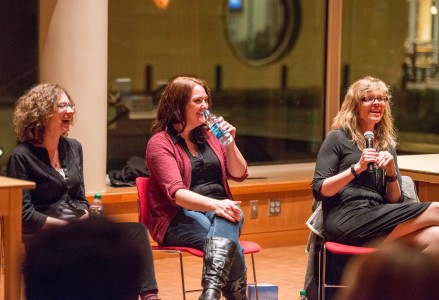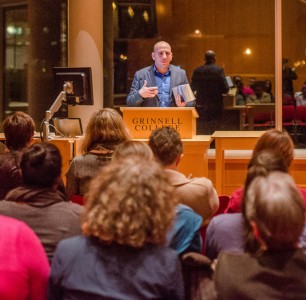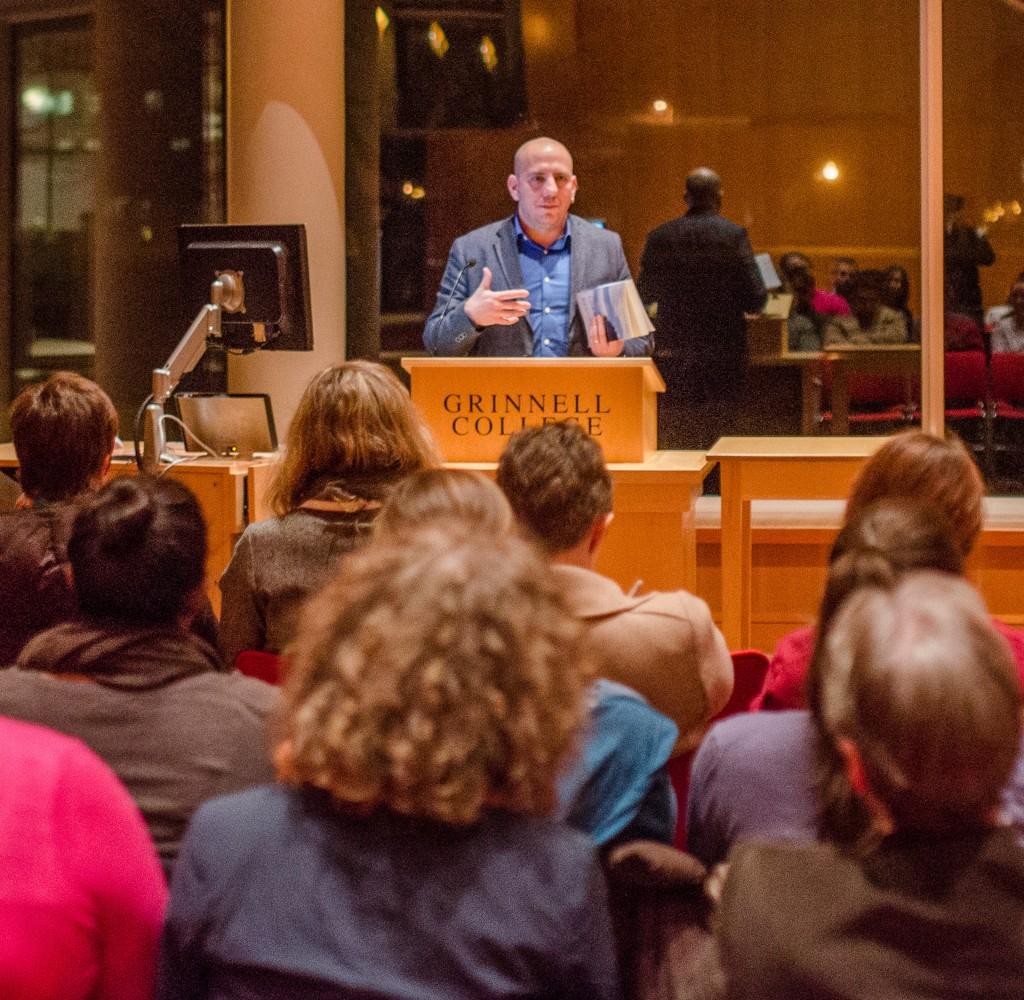
Beginning this past Wednesday, Grinnell has played host to a number of readings, panels and other events of interest to Grinnellians hoping to get involved in the fields of writing and publishing, all a part of the Writers After Grinnell Publishing Symposium, sponsored by the Writers@Grinnell program and The Wilson Program in Enterprise and Leadership, with support from the English Department and alumni donors. The intention of this symposium was to help students make alumni connections and gain valuable insights into the writing and publishing world and the many opportunities it has to offer.
Executive Director of National Novel Writing Month and author Grant Faulkner ’87 spoke in Dean Bakopoulos’ Craft of Fiction class this past Wednesday about flash fiction—stories of 1000 words or less. The online journal he co-founded with writer Lynn Mundell, 100 Word Story (100wordstory.org), publishes stories of exactly 100 words, a form started by former humanities professor Paul Strohm. However, Faulkner writes narratives of all lengths—his first novel will be released soon. He feels that length and form is decided by the story that comes to mind.
“I do get ideas for novels that I would never even conceive of making them flash [fiction]—they’re just too extensive,” Faulkner said. “Flash pieces, for me, they are more like poems, they’re about the telling of a moment. It’s intuitive, really. I don’t think about the length of a piece, it just happens to be the length it is. It’s whatever container fits the story.”
On Wednesday night, Young Adult fiction authors Molly Backes ’02 and Christa Desir ’96 gave a reading, followed by a Q&A session with literary agent Becca Stumpf ’04, about publishing and young adult and middle grade fiction. The three spoke to the differences involved in writing and publishing YA literature. Backes feels the main difference is how new and intense every experience is for young adults, although they all deal with the same issues of jealousy, loss and confusion that adults continue to experience every day.
“At the heart of every story is human relationships. … I’m thinking about [my readers and characters] as humans first, shockingly, and teenagers second,” Backes said. “Those emotions are heightened because you don’t have the experience that you’ve lived through it already. … When I’m thinking about accessing the teenage experience, I think about the difficulties I’m experiencing as an adult and then strip away the parts that are unique to adulthood—the parts where you stop caring as much what people think about you and you know you’re going to get through it.”
These differences in heightened experiences are what Backes enjoys about writing YA.
“If you’re a teen you’re like, ‘I literally don’t know what’s going to happen next!’” she said. “The thrill of experiencing things for the first time is so fun to relive and talk about.”
Yesterday afternoon, Stumpf, Faulkner, special sales manager at Sterling Publishing Victoria Horn ’04 and Second City alumnus and screenwriter Jim Fisher ’63 hosted a panel on careers in literature. They discussed the paths they had taken to where they currently are, spoke on the consistent rejection experienced in the publishing world and offered their thoughts on the best way to break into literary careers.
Faulkner’s post-graduation experience involved years of waiting tables before he found his way to non profit organizations and published writing.
“Grinnell prepared me to be a thinker and a great reader, but it didn’t necessarily give me tangible career skills, per se,” Faulkner said. “And part of that was my fault. I did just go recklessly into the world to be a writer.”
Faulkner believes he should have taken internships and writing-related jobs on-campus in order to better prepare for post-grad.
“I was a reporter at the Des Moines Register [in 1997]. It was the best job I’ve ever had. … When I think about myself graduating from Grinnell, what I should have done is gotten a job as a reporter right away.”
Backes’ career as a teacher started off fairly bump-free. She knew even before graduation that teaching was something she wanted to do—that was never a source of uncertainty.
“The leap for me was several years later … [when] my principal kept calling me in to scold me for ‘wasting too much time’ teaching writing in my English class,” she said.
Backes was teaching at a poor, rural school, and the No Child Left Behind Act was strongly affecting the way teachers approached the classroom.
“I became so disheartened … [feeling] like I’m preparing kids for the test and I think I’m making them dumber and it’s really upsetting. … I thought, ‘Well, if you’re not going to be a teacher … you have to be a writer. That’s the only other thing you have going for you.’”
Backes then dusted off a first draft of her now-published novel, “The Princesses of Iowa,” and embarked on the process of becoming a published writer. This was a moment that showed how important Grinnellian connections can be—Backes found Stumpf’s name and education information on the website of a publisher to whom she had pitched her novel. When she contacted Stumpf to share their Grinnellian connection, Stumpf read the book and said that she would represent Backes.
“Out of all the people that were interested in the book, Becca seemed to get it the most, and I also implicitly trusted her because she was a Grinnellian,” Backes said.
The career aspirations of Stumpf and Horn began with a Grinnell alumni connection, as well. The two went on an externship trip their senior year to New York to meet Grinnell alums who were working in the publishing business. This was when Stumpf discovered the position and responsibilities of a literary agent—a job she has found she loves.
“I love working with a variety of different people in the book publishing process. … I get to have all these little experiences within a given day,” Stumpf said. “I like having a strong relationship with my authors so that we can talk about their book on what it means on so many levels.”
However, Stumpf did not get to where she is now in any single big leap, but rather a series of steady steps. She advised that students take a year after graduation to gain a unique life experience and reflect before entering the work force or further education, and she encouraged them to take any possibilities that came their way because one never knows what they may become.
“It wasn’t one moment that changed my life in a single direction. I found that post-graduation is a series of small moments that accrue over time and make gradual changes,” she said.



































































